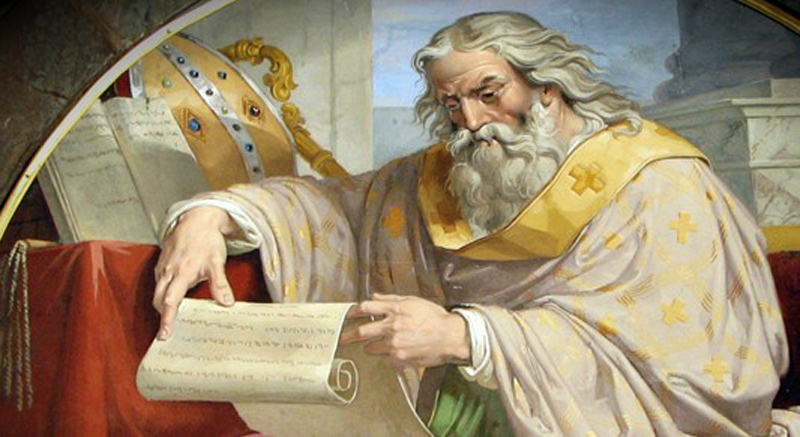(340-397)
Ambrose was born in Trier, Germany, to a Roman Christian family, the third son after two other children, the saints Marcellina and Satyrus.
In Rome he had completed his juridical studies in the footsteps of his father, prefect of Gaul, learning Greco-Latin oratory and literature. He lived during the time of the “Arian Controversy,” in which the very nature of Jesus Christ was in dispute.
On the one side, Arius, a scholar, submitted that since Jesus was born through God’s will, He was not eternal and therefore not of the essence of God. The theologian Athanasius argued that God had to become human so he could become divine. As such, Jesus was God manifested in human form.
In December 374, Ambrose, then governor of Lombardy, Liguria, and Emilia, was called upon to moderate with all his acquired skills, the heated debate in Milan that began after the death of the Arian bishop Absentius. The invitation of Ambrose to lead the dialogue convinced the people and avoided the outbreak of riots. Just when the governor thought he had accomplished his mission successfully, the unexpected happened: from the crowd a child’s voice rose loudly and found an echo in that of the entire assembly: “Ambrose for our bishop!”
Catholics and Arians in unexpected agreement had found their compromise candidate. The invocation of the people threw Ambrose: he felt inadequate — he was not even baptized. The emperor Valentinian tried to resist, but eventually conceded to the popular will.
Ambrose then fled, but Pope Damasus also considered him suitable for episcopal dignity. Ambrose therefore understood the call of God and accepted the bishopric of Milan, at only 34 years of age.
In his new position, Ambrose dedicated himself to the study of the sacred scriptures and the fathers of the church. “When I read the Scriptures,” he used to say, “God walks with me in Paradise.”
He learned to preach, and his oratory fascinated the young Augustine of Hippo, contributing to his conversion. He was generous to the poor though he became more and more frugal and austere in his own life.
“If the Church has gold it is not to protect it, but to give it to those in need,” he said, when he decided to melt down liturgical furnishings to pay the ransom of some faithful seized by Gothic soldiers.
Ambrose continued to oppose the Arians, which brought him into conflict with the pro-Arian empress Justina. he promoted the independence of spiritual power from the temporal one. When seven thousand people were massacred in an uprising Ambrose succeeded in provoking the repentance of Emperor Theodosius, who had ordered it. “The emperor is in the church, not above the church,” was the conviction of the Milanese bishop who, in spite of the law, did not even give a church to the Arians.
Ambrose also recognized the primacy of the bishop of Rome by asserting, Ubi Petrus, ibi Ecclesia — “Where Peter is, there is the Church.” Love for Christ, for the Church, for Mary emerges from the copious literary and theological production that has given him, together with Sts. Jerome, Augustine, and Gregory the Great, the title of Great Doctor of the Church of the West. Builder of basilicas, composer of hymns that revolutionized prayer, tireless in the prayer, Ambrose died on Holy Saturday of 397. A great crowd gathered to pay him homage on Easter Sunday.
Adapted by A. J. Valentini from: St. Ambrose, Bishop of Milan and Doctor of the Church – Information on the – Vatican News. (n.d.). Vatican News. Retrieved Dec. 1, 2020, from https://www.vaticannews.va/en/saints/12/07/st–ambrose–bishop-of-milan-and-doctor-of-the-church.html
